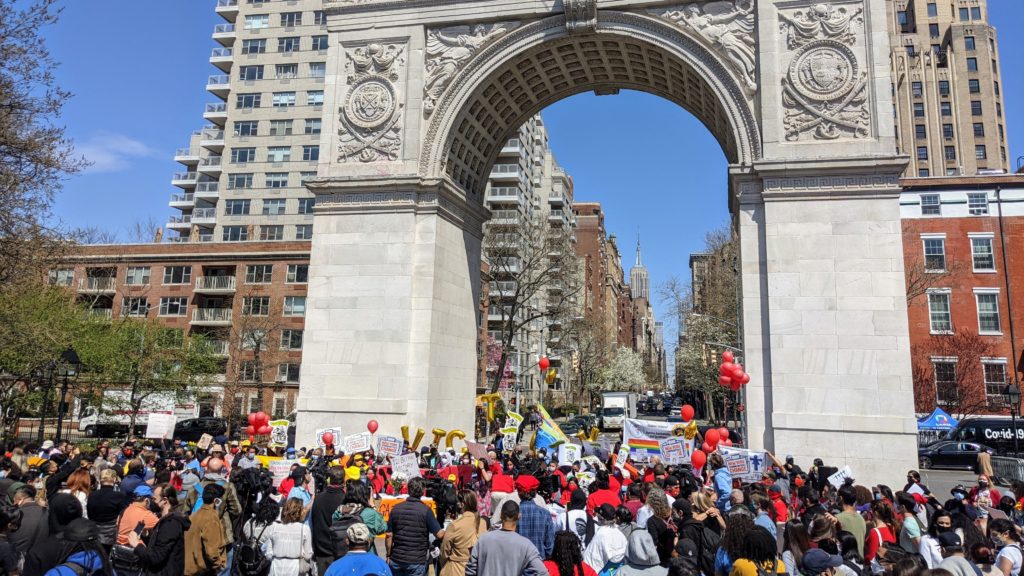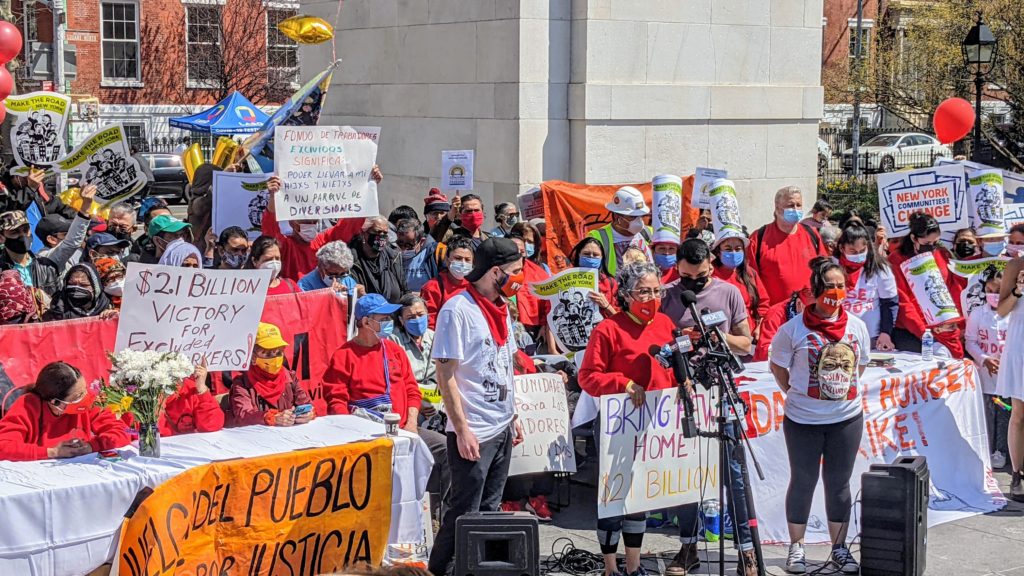
Volunteers of Legal Service (VOLS) applauds the creation of a first-of-its-kind, $2.1B Excluded Workers Fund in the FY 2022 Enacted Budget.
The New York State Excluded Workers Fund is a new $2.1 billion program to provide cash payments to workers who have suffered income loss due to COVID but who are ineligible for Unemployment Insurance or related Federal programs – such as those established by the CARES Act, Consolidated Appropriations Act, or the American Rescue Plan Act – due to their immigration status or other factors. Such workers must be low-income and provide sufficient documentation to establish work-related eligibility and residency in the state. The NYS Department of Labor is still making preparations for newly eligible workers to apply.
We thank the state legislators and community organizations who made the fund possible. VOLS provides free legal assistance to unemployed New Yorkers across all our programs, including our Unemployed Workers, Immigration, Microenterprise, and Elderly Projects. With a supporting network of pro bono attorneys, we advise clients on how to access and navigate the unemployment insurance system, and we represent individuals to appeal claims that were improperly decided.
In this blog post, VOLS reflects on the critical importance of this new law to excluded workers and to our city as a whole. And we provide an initial legal analysis of the legislation. Please again note that the new benefits will not be available until the program is fully established by the New York Department of Labor.
QUICK LINKS:
WHY IS THE EXCLUDED WORKERS FUND ESSENTIAL?
Black and Brown immigrant New Yorkers have been particularly impacted by the health and economic crises facing our communities during the pandemic, and yet many have been unable to access government programs developed in response to COVID-19.
VOLS and our clients have seen this problem firsthand, in particular as some of our Immigration Project clients were among the first individuals impacted by social distancing guidelines and economic closures mandated in early 2020. Many are young adults who are frontline service or healthcare workers, who suddenly faced widespread unemployment or newly unsafe working conditions. For those with work permits (such as through the DACA program), we advised them on eligibility and rules to access unemployment insurance benefits.
But undocumented New Yorkers without work permits were not eligible for relief. VOLS is a legal services provider. But at the onset of the crisis, we helped however we could, often providing information about food banks or cash assistance. Many of our clients and their families had to rely on informal support provided by friends, family, or local community-based organizations due to the exclusivity of state and federally-run programs. As the pandemic continued and the economy re-opened and closed in fits and starts, we advised on a range of employment and workplace legal issues. For all clients, we meanwhile provided free and confidential legal screenings to determine eligibility for immigration status or legal relief, as well as to advise on how accessing benefits relates to a client’s ability to adjust their status in the future.
Following are key facts to illuminate the scope of the challenge facing our clients and communities:
- 54% of essential workers in New York City are immigrants. *
- 192,000 undocumented workers in New York City have lost their jobs or been unable to work since the pandemic crisis began, with a 54% displacement rate among undocumented workers that is twice that of the 27% rate of the overall private sector workforce. **
- Immigrants in and around New York City reported remarkable health system failures and widespread COVID-related illness, overwhelming job losses without a safety net, insecure and/or unsafe housing and workplace conditions, and poor access to education across the immigrant community. ***
In this context, New York State’s Excluded Workers Fund is a dramatic and positive step to ensure that all New Yorkers can access the relief that they 7deserve. The VOLS team – including our Immigration Project and Unemployed Workers Project staff, as well as our network of volunteer lawyers – stands ready to assist excluded workers seeking legal advice and representation on issues related to this new relief program.
How did we get here?
On March 16, a group of excluded workers began a hunger strike that culminated a year-long advocacy campaign calling upon state legislators create the new Excluded Workers Fund, which was initially proposed in legislation introduced by New York State Assemblymember Carmen De La Rosa (AD72 – Manhattan) and Senator Jessica Ramos (SD13 – Queens). Twenty-three days later, on April 7, the strikers ate their first meal in public at a celebratory rally that followed a state budget agreement between the Legislature and the Governor to establish the $2.1 billion Excluded Workers Fund for FY 2022.
VOLS recognizes the brave leadership by the many New Yorkers who raised their voice and risked their safety to make this new law possible.
“There have been twenty-three days without food. Twenty-three days when I was hungry and in pain. But it hasn’t just been twenty-three days. It’s actually been decades of pain, the pain of indifference and negligence. Today, our work today has been recognized. Our dignity has been recognized, and our dignity has been lifted by passing this fund. It is more than $2.1 billion dollars. It is actually a recognition of undocumented workers. This is the future. This is the future that we’re leaving behind for our kids, and a reminder for those who doubted us. This is proof that we did it.”
Ana Ramírez, hunger striker and member of New York Communities for Change

Credits: Photos by Volunteers of Legal Service; Translation of Ana Ramirez’s remarks by amNY
VOLS LEGAL Analysis:
If you or someone you know seeks legal assistance in accessing this new New York State program, please contact the VOLS Unemployed Workers Project by phone or online.
About the Excluded Workers Fund
The new Excluded Workers Fund established in the New York State’s FY ‘22 budget is set to assist New Yorkers who have been deemed ineligible or are otherwise not eligible to receive unemployment insurance benefits, either through New York State-issued unemployment benefits or federal benefits set out in the CARES Act, Consolidated Appropriations Act or the American Rescue Plan Act.
Applicants will be able to apply for these benefits through the New York State Department of Labor once the New York State Commissioner of Labor establishes the application process. Claimants will have to provide proof of identity, proof of residency and proof of wages.The bill allows for a variety of wage-related documents, including a letter from a former employer, pay stubs or wage statements. Claimants who filed taxes can simply provide proof of tax returns from 2018, 2019 or 2020. All information that applicants provide is confidential.
HIGHLIGHTS:
- Benefits apply to claimants who suffered a loss of work-related earnings or household income as of Feb. 23, 2020 due to:
- The individual is unable to work due to COVID-19 pandemic (becoming unemployed, partially unemployed, unable to work, etc.)
- The individual has become major breadwinner or source of income because previous head of household died or was disabled during the state of emergency as declared by Executive Order 202
- The benefit period is retroactive from March 27, 2020 but no later than April 1, 2021
- Benefit computation:
- Those who filed taxes in 2018, 2019 or 2020 can receive:
$15,600, less $780 for taxes automatically deducted
- All others can receive:
$3,200, less $160 for taxes automatically deducted
- When a New Yorker files New York Income Tax return for the year 2021, the excluded worker may reconcile any tax liability for such tax year and claim any refund they’re entitled to.
- Those who filed taxes in 2018, 2019 or 2020 can receive:
- Requirements:
- Individuals cannot receive funds if in the previous 12 months prior to effective date the worker’s earnings were greater than $26,208.
- They must certify eligibility
- The application process is not yet established, and it will be determined by the Commissioner of Labor.
- Individuals must establish proof of identity, proof of residency, and proof of work-related eligibility. An applicant can submit the same documents for ID and residency. However, at least one of those documents must have a photo.
- Proof of Identity
- Applicants must produce “one or more” of the following totaling “four points”:
- IDNYC ID card (4), which is available to all New York City residents regardless of immigration status;
- Drivers license (4);
- Non-driver ID (4);
- Unexpired U.S. passport (4);
- Unexpired non-U.S. passport that is machine readable (3);
- NYS inpatient photo ID card (2);
- Marriage certificate (1);
- Divorce decree (1);
- NYC Parks and Recreation card, unexpired (1);
- Foreign birth certificate (1) ;
- Foreign ID card (1);
- Diploma/Transcript from U.S. school (1);
- Commissioner of Labor will determine point value of any additional documentation.
- Applicants must produce “one or more” of the following totaling “four points”:
- Proof of residency:
- Applicants must demonstrate name and residential address within NYS, they must show proof of residency prior to March 27, 2020, and ongoing/current residency. Ongoing/current cannot be earlier than March 7, 2021 (30 days prior to this act).
- Documentation includes:
- Some of the documents referenced above that have an residential address
- Utility bills
- Bank statements
- A letter from the local public housing authority
- Homeless shelter documentation
- Residential lease
- Home mortgage and other similar documentation Letter from non-profit that provides services to homeless.
- Other documents, to be determined by Commissioner of Labor
- Proof of Identity
- Documents submitted must be in English or accompanied by English translation. They cannot be “mutilated or damaged.”
- Proof of ineligibility/work status (with point values potentially to be assigned):
- Proof of filing tax returns from 2018, 2019, 2020;
- Letter from employer documenting dates of work and why they are no longer working for employer;
- At least 6 weeks of pay stubs from the six months prior to eligibility;
- At least 6 weeks of wage statements;
- A W-2 or 1099 tax form from 2019 or 2020 demonstrating wages or income;
- A wage notice pursuant to Sec. 195
- Other mandated policies:
- A New Yorker who is denied can request another review of the claim.
- Records are confidential – there will not be any indication of the documents used in the application, unless requested via judicial warrant or subpoena. The only people privy to this information are New York State Department of Labor workers.
- Applicants do not have to prove they are lawfully present in the U.S.
- New Yorkers can collect benefits if they mistakenly were awarded benefits, as long as those benefits are currently being recovered by the DOL.
- Recoupment is permissible by the State for those who were granted these funds so long as excluded worker is notified within 1 year of their claim of the recoupment.
- Applicants who make false statements and/or misrepresentations in an attempt to defraud the program may be subject to Class E felony criminal charges.
Key Facts provided by Make the Road, May 2020 Report: Impacts of the COVID Crisis on Working Class Immigrant, Black, and Brown New Yorkers
* Fiscal Policy Institute. “New York’s Essential Workers Overlooked, Underpaid, and Indispensable.” April 8, 2020. Available online: http://fiscalpolicy.org/12917-2
** Parrott, James A. and Lina Moe. “The New Strain of Inequality: The Economic Impact of Covid-19 in New York City.” April 15, 2020. Available online: http://www.centernyc.org/reports-briefs/2020/4/15/the-new-strain-of-inequality-the-economic-impact-ofcovid-19-in-new-york-city
*** Make the Road, May 2020 Report and Member Survey: Impacts of the COVID Crisis on Working Class Immigrant, Black, and Brown New Yorkers. Available online: https://maketheroadny.org/wp-content/uploads/2020/05/MRNY_SurveyReport_small.pdf
